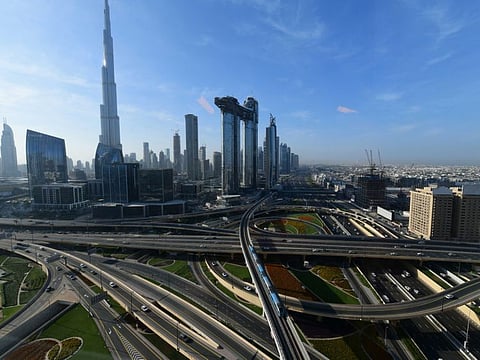COVID-19: Why Dubai’s digital infrastructure matters
We have minimised disruption by enabling the society to stay connected in coronavirus

Digital infrastructure has been a catalyst of the UAE’s economic growth and diversification for decades. It has stimulated innovation, unlocked potential and turned the country into an attractive hub for talent and investment.
Dubai’s smart infrastructure is now keeping our communities safe by enabling schools and businesses to swiftly and seamlessly adopt distance learning and remote working at a time when the world needs it most.
The speed at which this has been achieved is an accomplishment worthy of recognition.
His Highness Sheikh Mohammed Bin Rashid Al Maktoum, Vice-President, Prime Minister of the UAE and Ruler of Dubai, has praised the emirate’s digital transformation and robust infrastructure, which has made the country well-equipped to confront and overcome these headwinds
Dubai’s digital infrastructure has enabled all of us to stay connected, avoid disruption and ensure continuity during the COVID-19 global pandemic. It has allowed schools to continue teaching and businesses to continue operating remotely.
The efficiency in which these measures have been rolled out reflects the UAE’s readiness and preparedness to rise above exceptional circumstances, such as those facing the world today.
Overcoming the headwinds
His Highness Sheikh Mohammed Bin Rashid Al Maktoum, Vice-President, Prime Minister of the UAE and Ruler of Dubai, has praised the emirate’s digital transformation and robust infrastructure, which has made the country well-equipped to confront and overcome these headwinds.
But the ability of Dubai’s smart infrastructure to empower schools and businesses with super-fast connectivity would not have been possible had it not been for the vision of our leaders to turn the UAE into a knowledge-based economy more than 20 years ago.
This ambition led to the creation of Dubai Internet City — the first technology hub in the Middle East.
Today, it is the region’s largest tech community, home to 1,600 companies from multinational corporations to SMEs and start-ups employing more than 25,000 people. But it is not alone.
The UAE has a strong track record of developing smart infrastructure to support the country’s digital transformation. We became the first country in the world to create a Minister of State for Artificial Intelligence, a role currently fulfilled by Omar bin Sultan Al Olama.
The vision to create a world-class economy also led to the inception of Smart Dubai, which continues to leverage emerging technologies such as artificial intelligence, blockchain and data sciences to create effective and impactful change.
UAE's digital enterprise
Dubai Internet City is just one part of the UAE’s digital enterprise that has collectively allowed the public and private sector to work closely together.
The software and technology developed by the Fortune 500 companies and home-grown start-ups in Dubai Internet City has enabled schools and business to follow guidelines set by the relevant government authorities on social distancing whilst simultaneously staying connected.
Companies such as Microsoft, Cisco, Oracle, Zoho Corporation and in5 start-up Munfarid have helped organisations respond rapidly to complex and challenging dynamics.
Their cutting-edge connectivity solutions have enabled organisations to react fast to an evolving situation, adjust day-to-day operations and maintain momentum.
Many of these businesses have made enterprise-level conferencing tools available for free for a limited time. In March, Zoho Corporation set up its Small Business Emergency Subscription Assistance Programme to waive fees for small businesses using its software applications.
It has also launched a virtual productivity platform called Remotely to help businesses transition to remote working. It has been made free for all businesses worldwide.
Meanwhile, teachers across the country have deployed digital collaboration tools such as Microsoft Teams and Cisco Webex — a video conferencing tool — to create virtual classrooms.
Oracle is helping companies in the UAE navigate uncertainty with extensive online and cloud-based services ranging from supply chain management to enterprise resource planning.
Google, Dell, Hewlett-Packard, Accenture and IBM are also supporting the UAE with critical infrastructure. Globally, IBM has made its supercomputers available in the fight against COVID-19 to help researchers understand the virus, its treatments and potential cures.
Accenture, meanwhile, is helping businesses navigate the impact of the situation and make rapid decisions.
Technology from all of these companies is contributing to global efforts to beat the curve of COVID-19, which in turn is protecting jobs and the economy.
Economic competitiveness
The UAE has always strengthened its economic competitiveness and provided protections for businesses to ensure the country can overcome challenging times. The AED 256 billion economic stimulus package announced by the government has created the biggest financial firewall in the GCC.
It will support SMEs, mitigate uncertainty and reduce the cost of doing business. It also sends a strong message to the world that the UAE is prepared and ready to face these challenging circumstances and emerge stronger.
Many factors will contribute to the global effort to stem the rise of COVID-19. Our advanced digital infrastructure is one of them. The information technology sector is a modern foundation of the UAE’s diversified economy.
Schools, businesses, policymakers and private individuals depend on it more than ever before. It has been invaluable in these exceptional times.
The robust technological capabilities of companies who established their regional headquarters in Dubai Internet City have reinforced the UAE’s reputation as a leader in digital transformation and a catalyst for innovation.
Dubai’s world-class digital infrastructure will continue to play a key role in minimising disruption by enabling all sections of society to stay connected and safe.
— Ammar Al Malik is the managing director of Dubai Internet City






